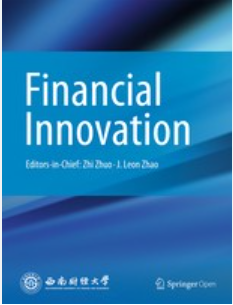Connectedness of cryptocurrency markets to crude oil and gold: an analysis of the effect of COVID-19 pandemic
IF 7.2
1区 经济学
Q1 BUSINESS, FINANCE
引用次数: 0
Abstract
The notion that investors shift to gold during economic market crises remains unverified for many cryptocurrency markets. This paper investigates the connectedness between the 10 most traded cryptocurrencies and gold as well as crude oil markets pre-COVID-19 and during COVID-19. Through the application of various statistical techniques, including cointegration tests, vector autoregressive models, vector error correction models, autoregressive distributed lag models, and Granger causality analyses, we explore the relationship between these markets and assess the safe-haven properties of gold and crude oil for cryptocurrencies. Our findings reveal that during the COVID-19 pandemic, gold is a strong safe-haven for Bitcoin, Litecoin, and Monero while demonstrating a weaker safe-haven potential for Bitcoin Cash, EOS, Chainlink, and Cardano. In contrast, gold only exhibits a strong safe-haven characteristic before the pandemic for Litecoin and Monero. Additionally, Brent crude oil emerges as a strong safe-haven for Bitcoin during COVID-19, while West Texas Intermediate and Brent crude oils demonstrate weaker safe-haven properties for Ether, Bitcoin Cash, EOS, and Monero. Furthermore, the Granger causality analysis indicates that before the COVID-19 pandemic, the causal relationship predominantly flowed from gold and crude oil toward the cryptocurrency markets; however, during the COVID-19 period, the direction of causality shifted, with cryptocurrencies exerting influence on the gold and crude oil markets. These findings provide subtle implications for policymakers, hedge fund managers, and individual or institutional cryptocurrency investors. Our results highlight the need to adapt risk exposure strategies during financial turmoil, such as the crisis precipitated by the COVID-19 pandemic.加密货币市场与原油和黄金的关联性:COVID-19 大流行的影响分析
对于许多加密货币市场而言,投资者在经济市场危机期间转向黄金的观点仍未得到验证。本文研究了 COVID-19 前和 COVID-19 期间交易量最大的 10 种加密货币与黄金和原油市场之间的联系。通过应用各种统计技术,包括协整检验、向量自回归模型、向量误差修正模型、自回归分布滞后模型和格兰杰因果关系分析,我们探讨了这些市场之间的关系,并评估了黄金和原油对加密货币的避险属性。我们的研究结果表明,在 COVID-19 大流行期间,黄金对比特币、莱特币和门罗币具有很强的避险功能,而对比特币现金、EOS、链链和卡达诺的避险潜力较弱。相比之下,黄金仅在大流行之前对莱特币和门罗币表现出较强的避险特性。此外,在 COVID-19 期间,布伦特原油成为比特币的强大避险工具,而西德州中质原油和布伦特原油对以太币、比特币现金、EOS 和 Monero 的避险属性较弱。此外,格兰杰因果关系分析表明,在 COVID-19 大流行之前,因果关系主要是从黄金和原油流向加密货币市场;然而,在 COVID-19 期间,因果关系的方向发生了转变,加密货币对黄金和原油市场产生了影响。这些发现为政策制定者、对冲基金经理以及个人或机构加密货币投资者提供了微妙的启示。我们的研究结果凸显了在金融动荡(如 COVID-19 大流行引发的危机)期间调整风险敞口策略的必要性。
本文章由计算机程序翻译,如有差异,请以英文原文为准。
求助全文
约1分钟内获得全文
求助全文
来源期刊

Financial Innovation
Economics, Econometrics and Finance-Finance
CiteScore
11.40
自引率
11.90%
发文量
95
审稿时长
5 weeks
期刊介绍:
Financial Innovation (FIN), a Springer OA journal sponsored by Southwestern University of Finance and Economics, serves as a global academic platform for sharing research findings in all aspects of financial innovation during the electronic business era. It facilitates interactions among researchers, policymakers, and practitioners, focusing on new financial instruments, technologies, markets, and institutions. Emphasizing emerging financial products enabled by disruptive technologies, FIN publishes high-quality academic and practical papers. The journal is peer-reviewed, indexed in SSCI, Scopus, Google Scholar, CNKI, CQVIP, and more.
 求助内容:
求助内容: 应助结果提醒方式:
应助结果提醒方式:


